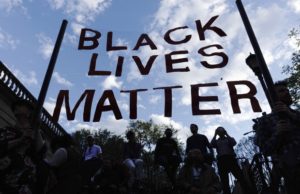
This Photo by Unknown Author is licensed under CC BY-NC-ND
In this milestone 100th episode of Into the Fold, we dive into the topic of racism and historical trauma with a panel of experts. We are joined by three former podcast guests: Dr. Christen Smith, an associate professor of African and Diaspora Studies and Anthropology at The University of Texas at Austin; Dr. Ryan Sutton, director of the Heman Sweatt Center for Black Males at The University of Texas at Austin; and Latasha Taylor, a mental health organizer and former Hogg Policy Fellow. Together, we discuss the impact of police brutality on African American mental health and ways non- Black allies can best support their friends and the Black Lives Matter movement.
Exhausted, Overwhelmed, but Inspired
We are living in a historic moment. Between the enduring worldwide pandemic and the recent surge of protests in response to the brutal murder of George Floyd and America’s legacy of institutional racism, it has been an especially challenging time for African Americans. Between our three guests this week, there is a shared sense of exhaustion mixed with feelings of hope and joy in seeing a critical mass of people finally showing up. “You hope and you hope and you pray,” explains Taylor, a longtime grassroots organizer. “To finally see people are caring and saying something and doing something – that is gratifying for me. So, I am excited too now.”
“Black People Are Not Here to Comfort You”
A consistent thread was the particular kind of fatigue that comes, ironically, from well-wishing non-Black friends and the added stress their solicitous check-ins can cause. Sometimes a person’s genuine concern for a Black friend’s well-being carries with it a subtext that has more to do with wanting space for their own discomfort than it does with honoring their friend’s experience. Smith reflects on these well-intentioned “checking-in” interactions with non- Black friends, saying, “It is rarely about comforting us. And it is mostly about their feelings of anxiety, and the kind of habitual ways that the privileges of white supremacy affords people this idea that Black people are here to comfort them all the time, especially Black women.”
Black Women’s Pain
On previous episodes, we discussed the unique health struggles faced by Black women. Recognizing that the recent surge of protests against police brutality are also inspired by the horrific story of Breonna Taylor, a Black woman who was murdered by police in her sleep, we reflect on how police violence and mass incarceration influence the experience of Black womanhood. “We can’t even sleep,” says Smith. “We are not even safe when we are sleeping in our homes … I was thinking about the impossible privacy of Black women, and how police violence terrorizes us with that invasion of privacy.” Taylor adds, “If you are a Black woman, you are never safe.” We know that the chronic stress and trauma that Black women experience impacts both their physical and mental health in ways that can even impact future generations through epigenetics and passed down historical trauma.
Would-Be Allies: Here’s What You Can Do
For would-be allies who want to show support to the Black people in their lives and engage with antiracism, our guests offer resources to read and causes to support. Taylor reminds us that right here in Travis County, a new women’s jail is being built – a project she is adamantly against. “I am not comfortable that you want to build a new women’s jail to address the trauma we just talked about,” she explains. Smith recommends that people educate themselves about issues like defunding the police or alternatives to prisons, and suggests Angela Davis’ Freedom is a Constant Struggle and the work of Ruthie Gilmore, prison abolitionist. Finally, Sutton suggests allies get comfortable challenging the status quo and challenging the systems that they may benefit from. “Use that discomfort as a compass. Lean into it and walk through it with follow-through,” he advises. “Do that instead of calling me and checking on me!”
Special thanks to Oddisee for granting us permission to use his exceptional music for this episode. Please give him your support!
Special thanks to KUT for granting us permission to use audio from one of its recent news reports.
Related content
- Episode 65: The Past Does Matter: Post Traumatic Slave Syndrome
- Episode 56: Police Violence and Black Women’s Health
- Episode 53: From Advocacy to Mobilization: the Role of the Marginalized
- Episode 34: Mental Health and the Black Student Athlete
- Young Minds Matter: Historical and Cultural Trauma
Learn more about our podcast and check out other episodes!
